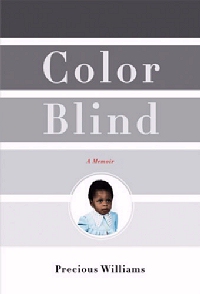
Color Blind: A Memoir
by Precious Williams
Bloomsbury, 2010
Reviewed by Barbara Free, M.A.
The book is a memoir of Precious’s life up to the time of her writing the book. It is a harrowing story of “private fostering” in England, a semi-legal system of parents advertizing children in a magazine, read by people who would select a child and take that child as a foster child, for quite small amounts of money, with no agencies, no social workers, therapists or anyone else involved that might have intervened on the child’s behalf, and with the foster parents having no rights to protect themselves or the child from harm.
In the author’s case, her mother advertized her when she was just ten weeks old, and the advertizement was answered by a woman who called herself Nanny, who had had several other African children, for short periods of time. Her desire to foster African children stemmed from having read Uncle Tom’s Cabin as a child and thereafter wanting to have African children to care for. She was a loving person but had her own problems, including an extreme phobia of germs. As for Precious’s birth mother, she had come to England and wanted to live a glamourous life with expensive clothes, a fancy address, and no encumbrances such as this child. She would come around from time to time, and abuse Precious physically, emotionally, and mentally, and Nanny was helpless to interfere. Later, “Mummy Elizabeth,” as she had been taught to call her, would take her away, against her will, and allowed her to be sexually abused by her friends and associates. As for Precious, she grew up surrounded by white people in West Sussex, on a “council estate” (roughly equivalent to subsidized housing projects). Nanny had grown up in a middle-class situation, but had married someone her family didn’t approve of, and she led a much less privileged adult life, ending up on the council estate, with her grown daughter and family living close by.
Precious’s birth father, whom she never knew, was from Sierra Leone. Her first foster home was when she was merely nine days old. When she was eight months old, her birth mother appeared at Nanny’s door and announced she was going to take Precious to Nigeria, packed up her clothes and toys (bought by Nanny) and left. Several months later, as Nanny was again perusing NurseryWorld magazine, she sees Precious advertized again, and she gets her back. The pattern of her mother disappearing and then showing up months or years later and reclaiming her continued. When Precious was six, her mother did, in fact, take her to Nigeria for Christmas, a frightening prospect for this little girl. She found that the family in Nigeria was very large and well off, but she felt completely out of her element. She contracted malaria there and had to be flown back to England to recover. In England, she was the only non- white child in her school and was harrassed by other students. Her foster family could not understand her confusion, telling her she was “just the same as we are underneath,” and telling her she was not black, that that was not a nice word, that she was “a colored child.” This was in the 1970s. Nanny taught her to read at a very early age, three or four, so she often seems older in the book than her chronological age. Throughout her life, in addition to Nanny and Nanny’s daughter, who is called “Aunt Wendy,” and her husband, “Mick,” and Nanny’s husband, Gramps, who is in a wheelchair following a stroke, and who dies when Precious is six, there are other foster children at times, including a younger black girl, Effua, and Precious’s own half-sister, Agnes, who has lived in Nigeria part of the time. Precious never feels she can confide in anyone about her thoughts or feelings, nor about what has happened to her, including the abuse when she was at her mother’s home in London, and a rape in her early teens. Her mother married and had two sons, both of whom she kept and raised, and very much preferred to Agnes and Precious.
As a teenager, Precious rebelled against both her foster family and her birth mother, and wound up living in London, more or less on the streets, but then, following the birth of her own daughter, when she was eighteen, she managed to get accepted by Oxford University. She left her infant daughter with Nanny and Aunt Wendy to raise, and did not really have a mother-daughter relationship with her. She states that she had grown up believing that only white women could really love and nurture a child, because her life experience was her own mother, and other black people who had also been farmed out to “private fostering.” She became a writer and interviewer for well-known magazines, moved to New York, and pursued her career there. As she got her own life in order, she was finally able to write the book and, as she stated in an interview I found online, able to build a relationship with her now-grown daughter.
As stated before, this is a harrowing, but compelling story. It exposes a system in England we had not heard about in the U.S. The fact that no one, including later social workers, seemed to intervene on her behalf, is appalling. Her ability to triumph seems amazing. She is finally able to see herself as, indeed, precious, and to use the name Precious, exclusively, never Anita. We would recommend the book and look forward to learning more about the author.
Excerpted from the April 2015 edition of the Operation Identity Newsletter
© 2015 Operation Identity